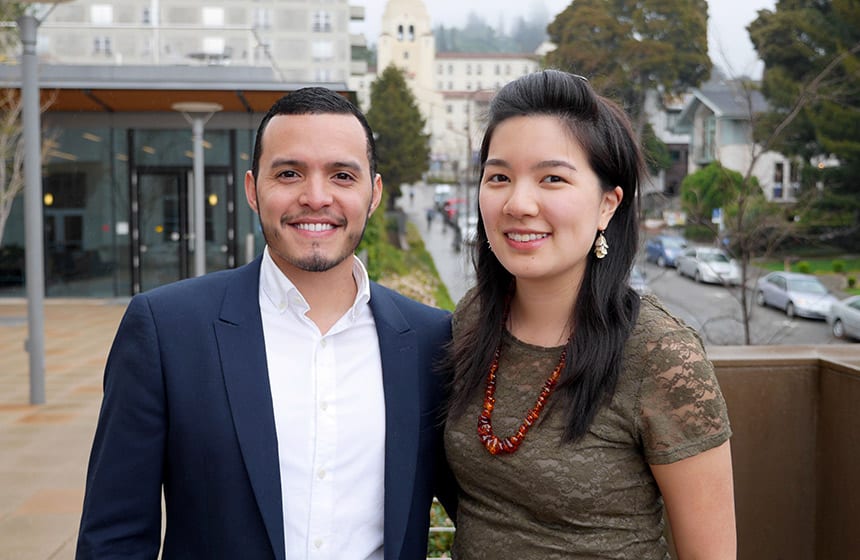
By Andrew Cohen
What started as a simple dinner conversation two months ago has morphed into a turbo-charged campaign to empower young voters in California.
Berkeley Law students Cindy Dinh ’16 and Paul Monge ’18 have drafted a bill that would automatically register college students to vote across the state. Now co-authored by two state legislators, the bill would register students within the UC, California State University and California Community College systems when they sign up for classes. Students may then opt out of registration if so inclined.
“Voter registration continues to be a significant barrier to public participation in our state’s democracy, especially among young people, who are a highly mobile population,” Monge said. “Young people move frequently, and when students move or their information changes, their registration records may not be updated at all—effectively keeping them off of the voter rolls.”
Dinh and Monge met in 2010 when they were law fellows at UC Berkeley’s Public Policy International Affairs Junior Summer Institute. Both are now pursuing MPP and J.D. degrees at the Harvard Kennedy School of Government and Berkeley Law, respectively. While catching up at dinner, they discussed their concerns about the state’s waning support of its public university system, and began brainstorming ways to empower students on issues affecting higher education.
Soon after the conversation turned to how registering more young voters would serve that goal effectively, Dinh and Monge began researching other automatic registration models across the country. After consulting with Berkeley Law faculty and staff, they developed a formal proposal and authored the bill’s initial language.
“We’ve been fortunate to have so many supporters provide insight on how automatic voter registration might look if it were implemented at the schools,” Dinh said. She credited Professor Bertrall Ross, Dean of Students Annik Hirshen, Registrar Carol Rachwald and University Registrar Walter Wong for having “an open-door policy and being gracious to meet with us early in the process.”
The students sent a formal proposal to San Francisco Assemblymember David Chiu’s “There Ought to Be a Law” program, through which citizens can submit ideas for legislation. Intrigued by the content, Chiu soon teamed with fellow Assemblymember Rob Bonta of Alameda to co-sponsor the “Student Voting Act.” They are currently working with Dinh, Monge, and legislative counsel to refine the bill’s language.
Building an alliance
In recent weeks, Dinh and Monge have met with lawmakers in Sacramento and traveled to other parts of California to enlist support. They are seeking endorsements from statewide organizations such as the California State Students Association and the Student Senate for California Community Colleges. Last weekend, they secured the endorsement of the University of California Student Association (UCSA)—which represents 240,000 students from all 10 UC campuses.
Dinh said that the UCSA has agreed to advocate for the bill, which involves urging the university’s Board of Regents and President Janet Napolitano to implement automatic voter registration on campuses—independent of the bill. California Secretary of State Alex Padilla has also spoken with officials at the state’s three public college systems about this effort.
“We care deeply about promoting a democracy that’s more inclusive of young people’s voices,” Monge said. “Through automatic student voter registration, we have an opportunity to add thousands of additional students onto the voter rolls and remove unnecessary obstacles to the ballot box.”
Dinh and Monge found inspiration for their idea from California’s “motor voter” law. Expected to be implemented next year, the law will automatically register those who apply for, or renew, their driver’s license.
Both students have long been passionate about voting rights, leading registration drives on their undergraduate campuses before enrolling at Berkeley Law. They also see the bill as a meaningful counter to the national trend of states restricting voting laws, such as reducing early voting periods and eliminating same-day registration.
“The debates across the states are often framed as a battle between electoral integrity and electoral access,” Dinh said. “Here, we can accomplish both goals by ensuring that the Secretary of State has the most up-to-date voter records from students who want to vote where they currently live—and by ensuring that those who are eligible to vote are properly registered.”
In the November 2014 statewide general election, only 8 percent of eligible Californians age 18 to 24 cast a ballot. That demographic made up only 4 percent of the entire voting electorate, and almost half of that age group’s members were not registered to vote. To rectify the problem, Monge believes that “modernizing and reimagining the way we register voters can meaningfully reduce some existing obstacles that contribute to lower youth turnout.”